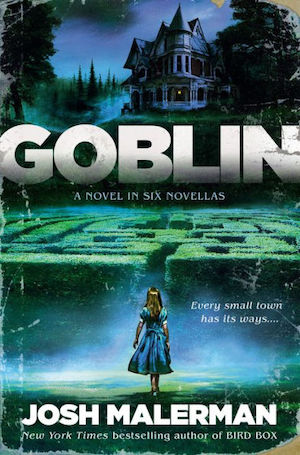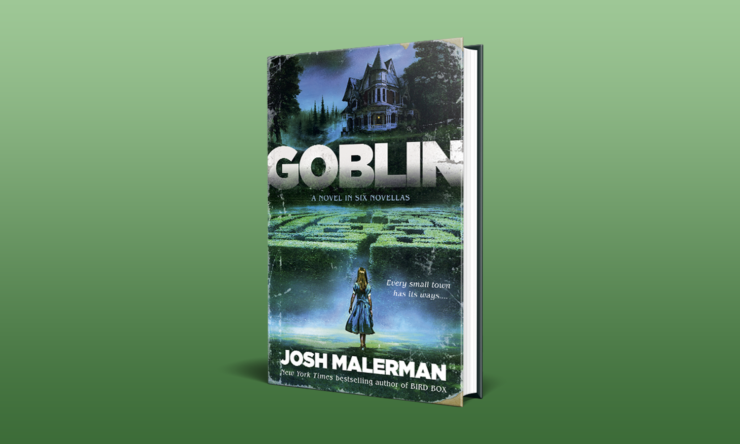Josh Malerman’s novel Goblin is subtitled “A Novel in Six Novellas,” a definition which may well make the overtly literal skew their heads in confusion. Goblin is also the city in which Goblin is set, and the six stories that comprise the book—seven if you count a framing sequence—offer a kind of portrait of a town from myriad perspectives. (Subtitling the book “A Town in Six Novellas” would have been just as accurate.) Earthling Publications first released this book in 2017; now, with Malerman’s profile significantly higher in the wake of the film adaptation of his novel Bird Box, it’s seeing wider release in a new edition.
The prospect of six novellas from Malerman is an inviting one, especially since his novels to date have covered a wide swath of horror subgenres. The back of this edition features a glowing quote from Sarah Pinborough, who compares Malerman’s Goblin to Stephen King’s Derry. And while that’s not inaccurate—King’s influence on a generation of writers is not small—there’s another writer who comes to mind even more when reading these stories and the wide range of styles they cover. But more on that in a moment.
The framing sequence follows Tom, a veteran truck driver, who’s assigned to convey a mysterious box to an address in Goblin, a city in Michigan. Tom grew up there, and he knows the way well; even so, certain things about the assignment unnerve him. The box he’s been asked to transport is a lot heavier than it’s supposed to be, for one thing. For another, he has a window of 30 minutes to deliver it; if no one receives it, Tom is supposed to destroy whatever’s inside. You probably don’t need to ask whether or not the box will exhibit some strange behavior—including the manifestation of unnerving sounds—on the drive to Goblin. Malerman is playing with archetypes here, down to the fact that the city around which this book is centered is literally named Goblin.
Buy the Book


Goblin
This book is more collection than novel; each of the six novellas is self-contained, though certain elements recur across the stories, sometimes in unexpected ways. Stylistically, Malerman uses the six novellas to show off different aspects of horror. “A Mix-Up at the Zoo” and “Kamp” both focus on characters whose grip on reality is fraying, while the plot of “Happy Birthday, Hunter” centers around a drunken hunt for a group of mysterious, sinister owls—and includes a trip into woods that may be haunted by an eldritch presence. Among the running motifs in the book is a hint of folk horror, as Goblin’s backstory includes land avoided by the local Indigenous population before white settlers arrived because of the horrors found there—a riff on familiar genre tropes that never quite gets enough room to breathe on its own.
The good thing about Goblin’s structure is that it allows Malerman to work in a host of styles. The tricky part, though, is that some of these novellas don’t work as well as others. Some of that may come down to personal taste, to be sure. Still, opener “A Man in Slices,” about the fraught friendship of two men, is arguably the least effective of the works here. “It was clear to everyone who met him that Charles was something problematic,” Malerman writes about one of the two men; the other, Richard, is his sole friend. And slowly, Charles reveals the story of a courtship laced with body horror to his friend—but since we’re told from the outset that something is off about Charles, it makes the story’s ending feel anticlimactic rather than harrowing.
Goblin’s best moments come when Malerman taps into a vein of Bradbury-esque weird nostalgia and then takes it somewhere unexpected. “The Hedges” is about a lonely artist and the girl who solves his hedge maze, and here Malerman neatly juxtaposes the story of the artist’s earlier life with a slow build to the revelation of what’s hidden at its center. The way Malerman uses time and dialogue to build suspense is fantastic, but the way the town’s police factor in—no spoilers, but it’s decidedly creepy—adds another dimension to the narrative.
“Presto” takes a similar approach, gradually building up a sense of anticipation over a performance by an acclaimed magician who goes by the name of Roman Emperor. At first Malerman builds tension by having other characters—a boy named Pete and the owner of the local magic shop—discuss him, and then gradually shifts the focus to Roman himself. Again, that sense of youthful idolization gives way to something much stranger; we learn how Roman came to be such a skilled magician, and what it cost him, culminating with an image both menacing and magnificently strange. Some of the best horror fiction is that which works on an unseen and alien logic. In “Presto,” Malerman demonstrates his command of that technique.
Reading Goblin put me in mind of the works of Charles L. Grant, notably his novel The Orchard. Here, too, Grant blended styles and tones in a composite work that centered around a geographic location. It’s an interesting structural choice in both cases, and a way for writers to show off what they can do in a number of contexts. It’s not surprising that, over the course of Goblin, Malerman references magic shows, zoos, and immersive mazes—all things that by design take the person experiencing them through very different experiences. Not all of those might click, from person to person, but the ambition is impressive in and of itself.
Goblin is available from Del Rey.
 Tobias Carroll is the managing editor of Vol.1 Brooklyn. He is the author of the short story collection Transitory (Civil Coping Mechanisms) and the novel Reel (Rare Bird Books).
Tobias Carroll is the managing editor of Vol.1 Brooklyn. He is the author of the short story collection Transitory (Civil Coping Mechanisms) and the novel Reel (Rare Bird Books).










